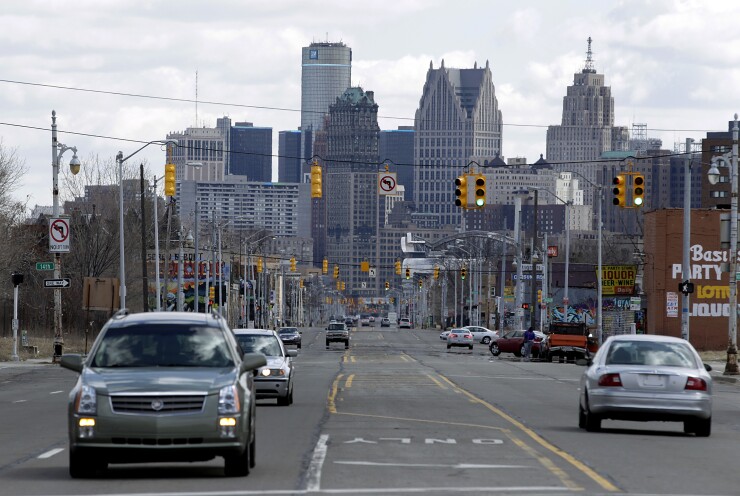Detroit’s post-Chapter 9 climb from speculative-grade rating territory faces a bigger hurdle due to the expected fiscal toll from the COVID-19 pandemic, S&P Global Ratings warned.
S&P on Thursday revised its outlook to negative from stable on the BB-minus issuer credit rating and 2018 unlimited tax-general obligation bonds. The rating is three rungs away from investment grade.
“The outlook revision reflects our view that Detroit is facing significant fiscal and economic pressure stemming from the COVID-19 pandemic and ensuing recession," said S&P analyst John Sauter. The outlook signals at least a one-in-three likelihood that S&P will take a negative rating action over the short term, which is generally up to one year for speculative-grade credits.

"In our view, Detroit is adequately situated to absorb the pressures over the coming months given its proactive management that has acted quickly and its very strong reserve and liquidity position but a delayed return to pre-pandemic revenue stability or much steeper decline in revenues than projected, would prove very challenging for the city,” Sauter said.
The city's Chief Financial Officer David Massaron could not immediately be reached to comment.
The city’s recovery since emerging from its historic Chapter 9 bankruptcy in December 2014 has remained on course, and balanced budgets allowed it to exit direct state oversight last year. It’s built reserves to help manage the looming resumption of pension contributions, but it has little room for error without slipping backward and it’s heavy reliance on economically sensitive taxes makes it all the more vulnerable to a recession. Capital spending and blight removal could also be impeded by the COVID-19 revenue hit setting back economic recovery efforts.
“Over the next year, if the city's reserves are depleted more than projected or it is facing an operating deficit that we anticipate will lead to either further cost deferrals or continued large use of reserves, we could lower the rating though likely further out on the time horizon, we could also do so if we feel the city does not remain adequately positioned to absorb future fixed-cost increases while remaining operationally balanced,” Sauter said.
S&P also revised its outlook to negative on the BB-plus rating on the city’s financial recovery income tax revenue and refunding local project bonds, issued through the Michigan Finance Authority’s Local Government Loan Program. The bonds are secured by a first lien on its municipal income taxes. A negative outlook is also now assigned to the city’s BB-plus rating on the Public Lighting Authority local project bonds issued through the MFA. The bonds are secured by the city’s utility users’ tax.
“We could lower the rating on both pledges if there were a negative rating action on our ICR and GO rating on Detroit,” S&P said. "Additionally, if either pledged revenues declined significantly beyond management's current forecasts or experienced large short-term collection disruptions, to the extent that our view of monthly or annual coverage is at a significantly higher risk, we could also lower the rating."
With its independence from state oversight at stake, Detroit Mayor Mike Duggan in mid-April laid out plans to deal with a $348 million COVID-19-driven revenue hit by dipping into reserves and the city’s fund balance, along with layoffs and pay cuts.
While existing federal aid packages will help cover expenses and future federal aid may offset tax losses, Duggan said the city can’t wait as it grapples with losses tied to the economic shutdown. That’s because its exit from state oversight in April 2018 required that it maintain balanced budgets. One slip-up and the city would return to oversight by the Financial Review Commission for three years under rules established when it exited bankruptcy.
The city operates on a roughly $1.1 billion general fund budget that’s part of the $2.2 billion all-funds budget. About 30% of the general fund comes from income taxes; 19% comes from state revenue sharing, which is based on a formula and tied to sales taxes; 17% comes from casino taxes; 10% comes from property taxes; and 24% comes from court fees, fines, and other revenues sources.
The city now projects double-digit losses to the income tax, revenue sharing, and casino streams, with additional losses from property taxes, parking meters and court fines. Casinos have been shuttered since March 17. The revisions will leave a $154 million hole in the current budget and projected gap of $194 million in next year's. Before the pandemic struck, the city was on pace to exceed estimates.
Duggan’s fix draws $101 million from the city’s “savings” account or unassigned fund balance, which heading into this year was at $123 million. Another $50 million would come from the city’s rainy day fund.
Another $72 million in funds set aside for blight removal in 2020 and 2021 would be tapped, along with $33 million in capital funds. Another $6 million would come from project savings achieved by the chief financial officer, and $36 million from a federal grant for transit. The remaining gap would be closed by a series of personnel cuts.
The plan leaves intact about $57 million in the rainy day fund, meeting a threshold laid out in bankruptcy agreements that the city hold 5% of the general fund in reserves. The proposed 2021 budget had called for a $30 million deposit to move the city closer to a 15% reserve goal. The plan also leaves intact the special retiree trust fund established to help blunt the budget impact in 2024 when the city will again be required to make pension contributions.





